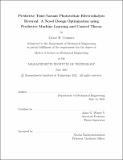| dc.contributor.advisor | Winter V, Amos G.,1979- | |
| dc.contributor.author | Connors, Grace B. | |
| dc.date.accessioned | 2022-01-14T15:17:21Z | |
| dc.date.available | 2022-01-14T15:17:21Z | |
| dc.date.issued | 2021-06 | |
| dc.date.submitted | 2021-06-30T15:16:04.566Z | |
| dc.identifier.uri | https://hdl.handle.net/1721.1/139521 | |
| dc.description.abstract | This paper introduces a novel control theory and system design optimization to reduce the Levelized Cost of Water (LCOW) and maximize the reliability of Photovoltaic Electrodialysis Reversal (PV-EDR) groundwater desalination systems. This work aims to exploit the relationship between water production and Specific Energy Consumption (SEC) for time-variant PV-EDR systems and to introduce a control system that optimizes the energy management strategy with a goal of maximizing water production as well as operates efficiently with respect to energy utilization. The novel control theory introduced in this paper consists of a machine learning algorithm used to predict the future solar irradiance, a model predictive controller to use this prediction to plan the best utilization of energy between the desalination system and energy storage, and a lower level controller that determines the optimal flow rate and voltage of the EDR system based on the power available for desalination. Furthermore, this paper aims to use this control theory to build a design tool that can determine optimal PV-EDR system configurations based on geographical constraints. The system design optimization is then tested for a case study of a rural village in India. As compared to previous works, this control theory reduces the LCOW by 7%, or $0.15/m3, while meeting the target water production every day. Moreover, this study demonstrates the flexibility of this design tool as well as the impact of the design assumptions through a sensitivity analysis. This study determines how to design and control PV-EDR systems to minimize cost and maximize reliability, improving the commercial viability of using PV-EDR systems as a primary water desalination solution. | |
| dc.publisher | Massachusetts Institute of Technology | |
| dc.rights | In Copyright - Educational Use Permitted | |
| dc.rights | Copyright MIT | |
| dc.rights.uri | http://rightsstatements.org/page/InC-EDU/1.0/ | |
| dc.title | Predictive Time-Variant Photovoltaic Electrodialysis Reversal: A Novel Design Optimization using Predictive Machine Learning and Control Theory | |
| dc.type | Thesis | |
| dc.description.degree | S.M. | |
| dc.contributor.department | Massachusetts Institute of Technology. Department of Mechanical Engineering | |
| mit.thesis.degree | Master | |
| thesis.degree.name | Master of Science in Mechanical Engineering | |
